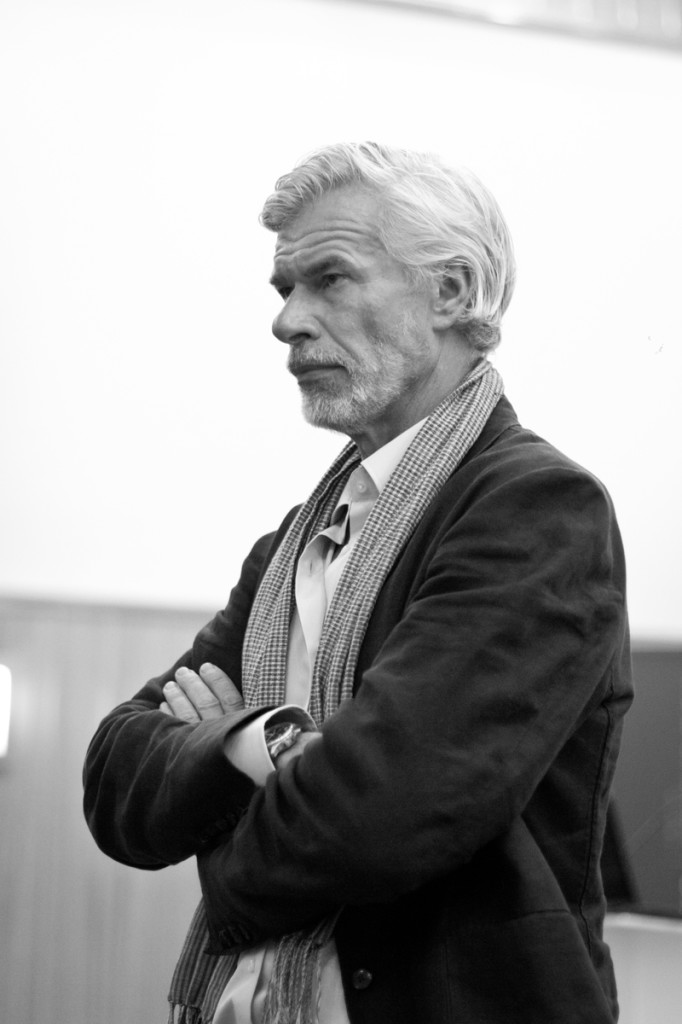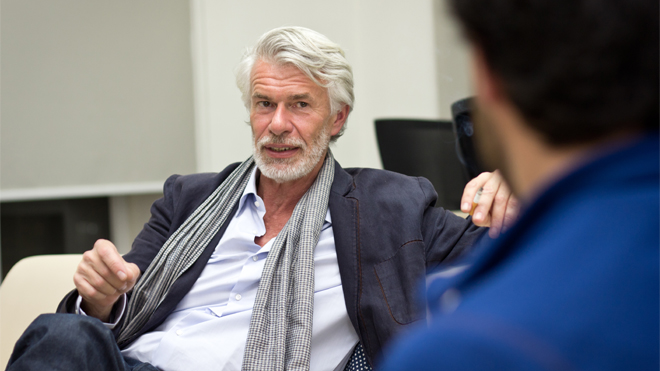by Ramsey George
Chris Dercon is known for the high-energy, establishment-shaking personality that has built his reputation in the art scene. Joining the Tate Modern as director in 2011, he now resides in the seat of authority he once sought to overhaul. Despite this, he sets out to connect opposites and build a “smaller” Tate Modern, even as the building expands.
He spoke at the Columbia Global Centers | Middle East in March 2014, and sat down with 7iber to discuss art, politics, and culture.
Chris Dercon does not shy away from tension or provocation. After a few niceties and exchanges with the audience, one of the guests mentioned, “I hope someday we’ll have a brand of the Tate Modern in Amman,” to an awkward pause. Dercon, without hesitation, retorted, “That is exactly what we don’t do! You didn’t get the lecture!”
For Dercon, museums should evolve into softer places, where a community can gather. “A museum is a theater; place of encounters and conversations. A perfect place to forget and a perfect place for repair,” Dercon said.
 With the financial crises helping end the big-box museums mania, it’s not just about capital, but also politics. “The question of the big museum is a geopolitical question. That is why you see museums in Doha, Dubai, Sharjah, but not in Manana or Kuwait City. But I also think also that the museum mania is over. We don’t have the money anymore.”
With the financial crises helping end the big-box museums mania, it’s not just about capital, but also politics. “The question of the big museum is a geopolitical question. That is why you see museums in Doha, Dubai, Sharjah, but not in Manana or Kuwait City. But I also think also that the museum mania is over. We don’t have the money anymore.”
Chris Dercon says many provocative statements, from “expanding the Tate to make it smaller”, to “supporting anti-capitalist activities”. Yet, many of the statements and exhibits by him are designed in just that way; to instigate tension and create the space for dialogue.
“There is tension, but for me it’s more about negotiating; constantly thinking, ping-ponging back and forth. In my opinion, the best art works are poetical; poetic and political at the same time,” said Mr. Dercon.
Even though not explicitly politically, Chris did discuss museums as inherently political spaces, at one point describing the Tate as “…a political party with 120,000 members.”
Holding true to his ability to align opposites next to each other, he switches comfortably between naming artists and art works throughout history into the language of entrepreneurs and high-tech startups. Chris discusses a sharing economy, blurring the line between a producer and an observer.
“People ask me what I do and I always say I’m an editor-in-chief, I’m a producer and a curator.”
With a growing art scene in the Middle East, including a hugely successful Art Dubai 2014, this year featured more artists and more activities than ever. Chris argued that art is on two different paths: one as a means of cultural production and creating new cultural techniques, and one as an investment and financial opportunity.
“Museums don’t buy art anymore; we can’t afford it,” said Dercon. The cost of art has increased dramatically as investors snap up art works as investment opportunities.
During the interview, we discussed a concept he mentioned a few times during his lecture: “civic imagination.” “Civic imagination is a space to understand your place in the world, to present and understand your place in the world with more than just words,” he said. According to Chris, using photography, for example, like the Arab Image Foundation, allows us to redefine and reimagine how we see our world. Dercon argues this is key for an innovative culture.
In Amman, various organizations are creating cultural spaces to encourage creativity, including Darat al Funoon and Makan. Countless other galleries, such as Jacaranda, Foresight, Nabad, and Orient provide spaces for artists to showcase their work.
“A lot of spaces in the Middle East are doing what we are trying to do with the Tate Modern. Creating soft spaces, opening spaces up to the public,” said Mr. Dercon. There is a plethora of arenas in Amman and around the region that are spawning creative and meaningful spaces for citizens to engage culturally. Mr. Dercon was almost jealous while naming the institutions. “Thankfully there will never be enough money in Amman to create big-box museums.”
